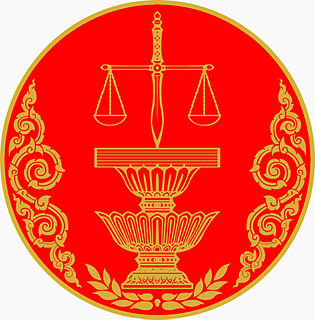 W
WThe Government of Thailand, or formally the Royal Thai Government, is the unitary government of the Kingdom of Thailand. The country emerged as a modern nation state after the foundation of the Chakri Dynasty and the city of Bangkok in 1782. The Revolution of 1932 brought an end to absolute monarchy and replaced it with a constitutional monarchy.
 W
WThe prime minister of Thailand is the head of government of Thailand. The prime minister is also the chair of the Cabinet of Thailand. The post has existed since the Revolution of 1932, when the country became a constitutional monarchy.
 W
WThe Anti-Money Laundering Office (AMLO) is Thailand's "key agency responsible for enforcement of the anti-money laundering and the counter-terrorism financing law." It was founded in 1999 upon the adoption of the Anti-Money Laundering Act, B.E. 2542 (1999) (AMLA). AMLO is an independent governmental agency. It has the status of a department functioning independently and neutrally under the supervision of the minister of justice, but is not part of the justice ministry. In 2016, Prime Minister Prayut Chan-o-cha ordered by the cabinet resolution change the command to under the supervision of the Prime Minister directly.
 W
WChaeng Watthana Government Complex, or formally, the Government Complex Commemorating His Majesty the King's 80th Birthday Anniversary, 5 December, BE 2550 (2007), is a complex of Thai Government buildings on Chaeng Watthana Road, Thung Song Hong Subdistrict, Lak Si District, Bangkok. The complex was built in commemoration of King Bhumibol Adulyadej's 80th birthday. The complex construction project started in 2005 under Thaksin Shinawatra's regime and was completed in 2008. Its opening ceremony was held on 17 February 2010 by Crown Prince Vajiralongkorn and Prince Dipangkorn Rasmijoti. The project cost 20,000 million baht.
 W
WThe Constitutional Court of the Kingdom of Thailand is an independent Thai court created by the 1997 Constitution with jurisdiction over the constitutionality of parliamentary acts, royal decrees, draft legislation, as well as the appointment and removal of public officials and issues regarding political parties. The current court is part of the judicial branch of the Thai national government.
 W
WThe House of Representatives is the lower house of the National Assembly of Thailand, the legislative branch of the Thai government. The system of government of Thailand is that of a constitutional monarchy and a parliamentary democracy. The system of the Thai legislative branch is modelled after the Westminster system. The House of Representatives has 500 members, all of which are democratically elected: 375 members were directly elected through single constituency elections, while the other 125 are elected through party-list proportional representation. The roles and powers of the House of Representatives were enshrined in the Constitution of 2017.
 W
WThe Leader of the Opposition is the politician in the politics of Thailand who leads the main minority party in the House of Representatives. Following the Westminster style parliamentary system, Thailand has had an official Leader of the Opposition since 1975. Under the 2007 Constitution the Leader of the Opposition was given an official role within the Thai political system. The constitution stipulates that the Leader of the Opposition must be selected after the Prime Minister and the Cabinet has taken office.
 W
WThe President of the National Legislative Assembly of Thailand was the presiding officer within the National Legislative Assembly.
 W
WThe National Anti-Corruption Commission is a constitutional organization of Thailand. It is sometimes confused with the Anti-Corruption Organization of Thailand (ACT), a private foundation.
 W
WThe National Assembly of Thailand is the bicameral legislative branch of the government of Thailand. It convenes in the Sappaya-Sapasathan, Dusit District, Bangkok.
 W
WThe National Legislative Assembly of Thailand was the unicameral legislative branch of the government of Thailand during the National Council for Peace and Order military junta between 2014 and 2019.
 W
WThe President of the National Assembly is the presiding officer (speaker) of the National Assembly of Thailand. Since 1997, the office has been an ex officio position occupied by the Speaker of the House of Representatives of Thailand. The President is therefore an MP, usually from the majority party in the House of Representatives. The President is elected at the beginning of a House session immediately after an election, there are no term limits for the office. In the aftermath of the Coup d'état in 2014, the function of legislative assembly was turned over to the junta-controlled National Legislative Assembly, which Pornpetch Wichitcholchai, President of the National Legislative Assembly, is occupying ex officio position of President of the National Assembly.
 W
WThe Royal Thai Government Gazette, frequently abbreviated to Government Gazette (GG) or Royal Gazette (RG), is the public journal and newspaper of record of Thailand. Laws passed by the government generally come into force after publication in the GG. The Royal Thai Government Gazette is the first Thai-language newspaper to appear in the kingdom and is also one of the earliest newspapers in Asia that is still in publication. The Cabinet Secretariat, a department in the Office of the Prime Minister, is charged with printing the GG.
 W
WThe Senate of Thailand is the upper house of the National Assembly of Thailand,. In accordance with the 2017 Constitution of Thailand, the Senate is a non-partisan legislative chamber, composed of 250 members. All 250 Senators are appointed by the Royal Thai Military. Senators serve five year terms in office.
 W
WThe Supreme Court of Thailand, located in Bangkok, Thailand, is the highest Thai court of justice, covering criminal and civil cases of the entire country. Operating separately from the Administrative Court and the Constitutional Court, the judgment from the Supreme Court is considered as final. Neither plaintiff nor respondent can request for any further appeals.